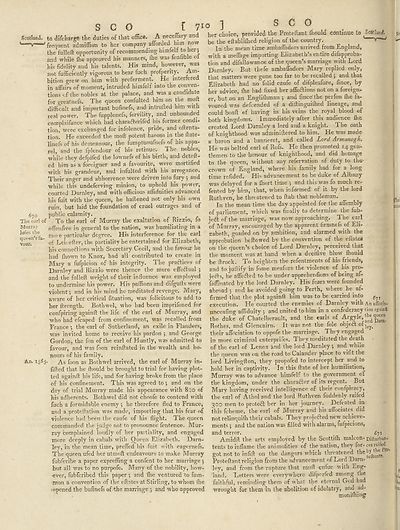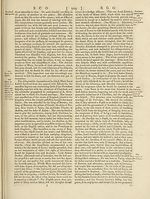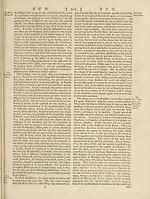Encyclopaedia Britannica, or, a Dictionary of arts, sciences, and miscellaneous literature : enlarged and improved. Illustrated with nearly six hundred engravings > Volume 18, RHI-SCR
(748) Page 710
Download files
Complete book:
Individual page:
Thumbnail gallery: Grid view | List view

670
The earl of
Murray
lofes the
queen’s fa¬
vour.
SCO [ 71
Scotland, to dxfcltarge the duties of that office. A neceffary and
frequent admiffion to her company afforded him now
the fulleft opportunity of recommending himfelf to her j
and while flie approved his manners, fhe was fenlible of
his fidelity and his talents. His mind, however, was
not fufficiently vigorous to bear fuch profperity. Am¬
bition grew on him with preferment. He interfered
in affairs of moment, intruded himfelf into the conven¬
tions of the nobles at the palace, and was a candidate
for greatnefs. The queen confulted him on the molt
difficult and important bufinefs, and intruded him with
real power. The fupplenefs, fervility, and unbounded
complaifance which had charafterifed his former condi¬
tion, were exchanged for infolence, pride, and oftenta-
tion. He exceeded the mod potent barons in the date-
linefs of his demeanour, the fumptuoufnefs of his appa¬
rel, and the fplendour of his retinue. I he nobles,
while they defpifed the lownefs of his birth, and deted-
ed him as a foreigner and a favourite, were mortified
with his grandeur, and infulted with his arrogance.
Their anger and abhorrence were driven into fury 5 and
while this undeferving minion, to uphold his power,
courted Darnley, and with officious affiduities advanced
his fuit with the queen, he hadened not only his own
ruin, but laid the foundation of cruel outrages and of
public calamity.
To the earl of Murray the exaltation of Rizzio, fo
offendve in general to the nation, was humiliating in a
more particular degree. His interference for the earl
of Leiceder, the partiality he entertained for Elizabeth,
his connexions with Secretary Cecil, and the favour he
had ffiown to Knox, had all contributed to create in
Mary a fufpicion of his integrity. The praXices of
Darnley and Rizzio were thence the more effeXual *,
and the fulled weight of their influence was employed
to undermine his power. His paffions and difguds were
violent-, and in his mind he meditated revenge. Mary,
aware of her critical fituation, was folicitous to add to
her drength. Bothwel, who had been imprifoned for
confpiring againd the life of the earl of Murray, and
who had efcaped from confinement, was recalled from
France the earl of Sutherland, an exile in Flanders,
was invited home to receive his pardon ; and George
Gordon, the fon of the earl of Huntly, was admitted to
favour, and was foon reindated in the wealth and ho¬
nours of his family.
An. 1,565. As foon as Bothwel arrived, the earl of Murray in-
fided that he ffiould be brought to trial for having plot¬
ted againd his life, and for having broke from the place
of his confinement. This was agreed to and on the
day of trial Murray made his appearance with 800 of
his adherents. Bothwel did not choofe to contend with
fuch a formidable enemy ; he therefore fled to France,
and a protedation was made, importing that his fear of
violence had been the caufe of his dight. The queen
commanded the judge not to pronounce fentence. Mur¬
ray complained loudly of her partiality, and engaged
wore deeply in cabals with Queen Elizabeth. Darn¬
ley, in the mean time, preffed his fuit with eagernefs.
The queen ufed her utmoft endeavours to make Murray
fubferibe a paper expreffing a confent to her marriage $
but all was to no purpofe. Many of the nobility, how¬
ever, fubfcribed this paper ; and fine ventured to fum-
mon a convention of the edates at Stirling, to whom die
'opened the bufinefs of the marriage j and who approved
o 3 SCO
her choice, provided the Protedant ffiould continue to Seftlanl.
be the edablidied religion of the country. ’
In the mean time ambaffadors arrived from England,
with a meffage importing Elizabeth’s entire difapproba-
tion and difallowance of the queen’s marriage with Lord
Darnley. But thefe ambaffadors Mary replied only,
that matters were gone too far to be recalled } and that
Elizabeth had no folid caufe of difpleafure, fince, by
her advice, fhe had fixed her affeXions not on a foreign¬
er, but on an Engliffiman and fince the perfon die fa¬
voured was defeended of a didinguiffied lineage, and
could bond ©f having in his veins the. royal. blood of
both kingdoms. Immediately after this audience die
created Lord Darnley a lord and a knight. The oath
of knighthood was adminidered to him. He was made
a baron and a banneret, and called Lord Armanagh*
He was belted earl of Rofs. He then promoted 14 gen¬
tlemen to the honour of knighthood, and did homage
to the queen, without any refervation of duty to the-
crown of England, where his family had for a long
time redded. His advancement to be duke of Albany
was delayed for a fhort time 5 and this was fo much re-
fented by him, that, when informed of it by the lord
Ruthven, he threatened to flab that nobleman.
In the mean time the day appointed for the affembly
of parliament, which was finally to determine the lub-
jeX of the marriage, was now approaching. The earl
of Murray, encouraged by the apparent firmnefs of Eli¬
zabeth, goaded on by ambition, and alarmed with the
approbation beftowed by the convention of the eflatefi
on the queen’s choice of Lord Darnley, perceived that
the moment was at band when a deciiive blow fhould
be ft ruck. To heighten the refentments of his friends,
and to juftify in fome meafure the violence of his pro-
jeXs, he affeXed to be under apprehenfions of being af-
faffinated by the lord Darnley. His fears were founded
abroad and he avoided going to Perth, where, he. af¬
firmed that the plot againft him was to be carried into
execution. He courted the enemies of Darnley with An aflbcia*
unceafing affiduity ; and united to him in a confederacy tion againft
the duke of Chatelherault, and the earls of A.rgyle, ^que^n
Rothes, and Glencairn. It was nnt the foie objeX of ^
their affociation to oppofe the marriage. . They engaged
in more criminal enterprifes. 1 hey meditated the death
of the earl of Lenox and the lord Darnley } and. while
the queen was on the road to Calander place to vifit the
lord Livingfton, they propofed to intercept her and to
hold her in captivity. In this ftate of her humiliation,
Murray was to advance himfel.fi to the government of
the kingdom, under the character of its regent. . But
Mary having received intelligence of their conlpiracy,
the earl of Athol and the lord Ruthven fuddenly railed
qoo men to proteX her in her journey. Defeated in
this fcheme, the earl of Murray and his affociates did
not relinquifti their cabals. They projeXed new achieve¬
ments ; and the nation was filled with alarms, fuipicions,
and terror. _ 672
Amidft the arts employed by the Scottifti malcon- Difturban-
tents to inflame the animofities of the nation, they for-ces railed
got not to infift on the dangers which threatened thehM^
Proteftant religion from the advancement of Lord Darn¬
ley, and from the rupture that muft enlue with Eng¬
land. Letters were everywhere difperfed among the
faithful, reminding them of what the eternal God had
wrought for them in the abolition of idolatry, and .ad-
m on idling
The earl of
Murray
lofes the
queen’s fa¬
vour.
SCO [ 71
Scotland, to dxfcltarge the duties of that office. A neceffary and
frequent admiffion to her company afforded him now
the fulleft opportunity of recommending himfelf to her j
and while flie approved his manners, fhe was fenlible of
his fidelity and his talents. His mind, however, was
not fufficiently vigorous to bear fuch profperity. Am¬
bition grew on him with preferment. He interfered
in affairs of moment, intruded himfelf into the conven¬
tions of the nobles at the palace, and was a candidate
for greatnefs. The queen confulted him on the molt
difficult and important bufinefs, and intruded him with
real power. The fupplenefs, fervility, and unbounded
complaifance which had charafterifed his former condi¬
tion, were exchanged for infolence, pride, and oftenta-
tion. He exceeded the mod potent barons in the date-
linefs of his demeanour, the fumptuoufnefs of his appa¬
rel, and the fplendour of his retinue. I he nobles,
while they defpifed the lownefs of his birth, and deted-
ed him as a foreigner and a favourite, were mortified
with his grandeur, and infulted with his arrogance.
Their anger and abhorrence were driven into fury 5 and
while this undeferving minion, to uphold his power,
courted Darnley, and with officious affiduities advanced
his fuit with the queen, he hadened not only his own
ruin, but laid the foundation of cruel outrages and of
public calamity.
To the earl of Murray the exaltation of Rizzio, fo
offendve in general to the nation, was humiliating in a
more particular degree. His interference for the earl
of Leiceder, the partiality he entertained for Elizabeth,
his connexions with Secretary Cecil, and the favour he
had ffiown to Knox, had all contributed to create in
Mary a fufpicion of his integrity. The praXices of
Darnley and Rizzio were thence the more effeXual *,
and the fulled weight of their influence was employed
to undermine his power. His paffions and difguds were
violent-, and in his mind he meditated revenge. Mary,
aware of her critical fituation, was folicitous to add to
her drength. Bothwel, who had been imprifoned for
confpiring againd the life of the earl of Murray, and
who had efcaped from confinement, was recalled from
France the earl of Sutherland, an exile in Flanders,
was invited home to receive his pardon ; and George
Gordon, the fon of the earl of Huntly, was admitted to
favour, and was foon reindated in the wealth and ho¬
nours of his family.
An. 1,565. As foon as Bothwel arrived, the earl of Murray in-
fided that he ffiould be brought to trial for having plot¬
ted againd his life, and for having broke from the place
of his confinement. This was agreed to and on the
day of trial Murray made his appearance with 800 of
his adherents. Bothwel did not choofe to contend with
fuch a formidable enemy ; he therefore fled to France,
and a protedation was made, importing that his fear of
violence had been the caufe of his dight. The queen
commanded the judge not to pronounce fentence. Mur¬
ray complained loudly of her partiality, and engaged
wore deeply in cabals with Queen Elizabeth. Darn¬
ley, in the mean time, preffed his fuit with eagernefs.
The queen ufed her utmoft endeavours to make Murray
fubferibe a paper expreffing a confent to her marriage $
but all was to no purpofe. Many of the nobility, how¬
ever, fubfcribed this paper ; and fine ventured to fum-
mon a convention of the edates at Stirling, to whom die
'opened the bufinefs of the marriage j and who approved
o 3 SCO
her choice, provided the Protedant ffiould continue to Seftlanl.
be the edablidied religion of the country. ’
In the mean time ambaffadors arrived from England,
with a meffage importing Elizabeth’s entire difapproba-
tion and difallowance of the queen’s marriage with Lord
Darnley. But thefe ambaffadors Mary replied only,
that matters were gone too far to be recalled } and that
Elizabeth had no folid caufe of difpleafure, fince, by
her advice, fhe had fixed her affeXions not on a foreign¬
er, but on an Engliffiman and fince the perfon die fa¬
voured was defeended of a didinguiffied lineage, and
could bond ©f having in his veins the. royal. blood of
both kingdoms. Immediately after this audience die
created Lord Darnley a lord and a knight. The oath
of knighthood was adminidered to him. He was made
a baron and a banneret, and called Lord Armanagh*
He was belted earl of Rofs. He then promoted 14 gen¬
tlemen to the honour of knighthood, and did homage
to the queen, without any refervation of duty to the-
crown of England, where his family had for a long
time redded. His advancement to be duke of Albany
was delayed for a fhort time 5 and this was fo much re-
fented by him, that, when informed of it by the lord
Ruthven, he threatened to flab that nobleman.
In the mean time the day appointed for the affembly
of parliament, which was finally to determine the lub-
jeX of the marriage, was now approaching. The earl
of Murray, encouraged by the apparent firmnefs of Eli¬
zabeth, goaded on by ambition, and alarmed with the
approbation beftowed by the convention of the eflatefi
on the queen’s choice of Lord Darnley, perceived that
the moment was at band when a deciiive blow fhould
be ft ruck. To heighten the refentments of his friends,
and to juftify in fome meafure the violence of his pro-
jeXs, he affeXed to be under apprehenfions of being af-
faffinated by the lord Darnley. His fears were founded
abroad and he avoided going to Perth, where, he. af¬
firmed that the plot againft him was to be carried into
execution. He courted the enemies of Darnley with An aflbcia*
unceafing affiduity ; and united to him in a confederacy tion againft
the duke of Chatelherault, and the earls of A.rgyle, ^que^n
Rothes, and Glencairn. It was nnt the foie objeX of ^
their affociation to oppofe the marriage. . They engaged
in more criminal enterprifes. 1 hey meditated the death
of the earl of Lenox and the lord Darnley } and. while
the queen was on the road to Calander place to vifit the
lord Livingfton, they propofed to intercept her and to
hold her in captivity. In this ftate of her humiliation,
Murray was to advance himfel.fi to the government of
the kingdom, under the character of its regent. . But
Mary having received intelligence of their conlpiracy,
the earl of Athol and the lord Ruthven fuddenly railed
qoo men to proteX her in her journey. Defeated in
this fcheme, the earl of Murray and his affociates did
not relinquifti their cabals. They projeXed new achieve¬
ments ; and the nation was filled with alarms, fuipicions,
and terror. _ 672
Amidft the arts employed by the Scottifti malcon- Difturban-
tents to inflame the animofities of the nation, they for-ces railed
got not to infift on the dangers which threatened thehM^
Proteftant religion from the advancement of Lord Darn¬
ley, and from the rupture that muft enlue with Eng¬
land. Letters were everywhere difperfed among the
faithful, reminding them of what the eternal God had
wrought for them in the abolition of idolatry, and .ad-
m on idling
Set display mode to:
![]() Universal Viewer |
Universal Viewer | ![]() Mirador |
Large image | Transcription
Mirador |
Large image | Transcription
Images and transcriptions on this page, including medium image downloads, may be used under the Creative Commons Attribution 4.0 International Licence unless otherwise stated. ![]()
| Permanent URL | https://digital.nls.uk/193028431 |
|---|
| Attribution and copyright: |
|
|---|
| Description | Ten editions of 'Encyclopaedia Britannica', issued from 1768-1903, in 231 volumes. Originally issued in 100 weekly parts (3 volumes) between 1768 and 1771 by publishers: Colin Macfarquhar and Andrew Bell (Edinburgh); editor: William Smellie: engraver: Andrew Bell. Expanded editions in the 19th century featured more volumes and contributions from leading experts in their fields. Managed and published in Edinburgh up to the 9th edition (25 volumes, from 1875-1889); the 10th edition (1902-1903) re-issued the 9th edition, with 11 supplementary volumes. |
|---|---|
| Additional NLS resources: |
|

